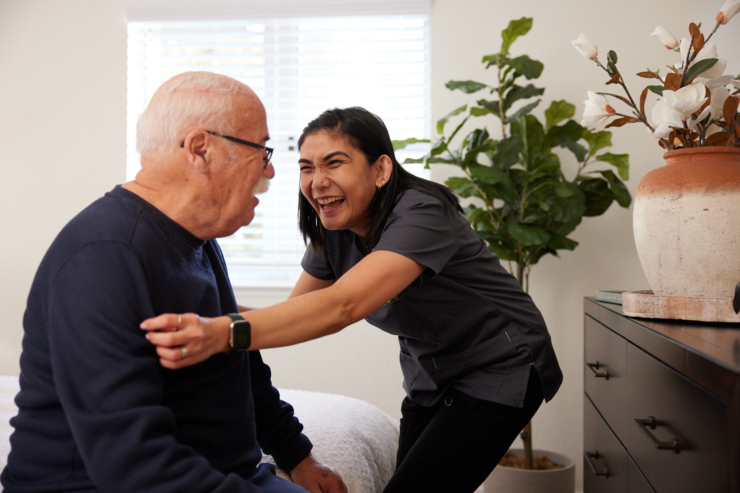
Awareness of depression symptoms in seniors: navigating the winter holidays
As the winter holidays approach, many of us look forward to festive celebrations, time spent with loved ones, and all the joy that this season brings. However, the winter months can sometimes bring an unexpected wave of sadness and isolation, intensifying existing feelings of depression, especially for seniors. In fact, approximately 4% of older adults aged 70 and over experience depression, yet the signs often go unnoticed. It’s important to recognize the signs of depression in seniors, especially as changes in routine and traditions during the holidays can affect their mental well-being.
Early Signs of Depression in Seniors
Recognizing the signs of depression in seniors is crucial for early intervention. While not everyone experiences depression the same way, according to the National Institute of Mental Health, common signs of depression include:
- Persistent sadness or hopelessness: One of the most challenging symptoms of depression is persistent sadness. Seniors may seem down for an extended period or express feelings of despair.
- Loss of interest in activities: Hobbies, socializing, or even maintaining personal care might become less important to them.
- Fatigue or sleep issues: Seniors may experience significant changes in their sleep habits, such as oversleeping or trouble sleeping.
- Physical symptoms: Unexplained aches and pains, changes in appetite, or weight fluctuations can be linked to depression.
- Social withdrawal: Seniors may isolate themselves or stop attending social gatherings, even when they are typically social.
- Difficulty concentrating or making decisions: Those exhibiting early signs of depression might have trouble concentrating, remembering simple things and making decisions for themselves.
Common Causes of Depression in Seniors
Depression in seniors can stem from various factors, and understanding these underlying causes can help loved ones provide better support. Often, these causes interact and addressing them can reduce the risk of depression or alleviate existing symptoms.
- Medical conditions: One of the most common causes of depression is chronic disease such as cancer, diabetes, arthritis, and dementia. According to data from Texas Health and Human Services, over 90% of older adults have at least one chronic condition, and 77% have two or more.
- Social isolation and loneliness: A lack of social isolation and feelings of loneliness in older adults are major risk factors towards mental health conditions in later life, affecting about a quarter of older people.
- Sleep problems: Poor sleep quality is common in seniors and is strongly linked to depression. Difficulty falling asleep, staying asleep, or waking up too early can lead to irritability, fatigue, and mood swings, all of which contribute to depressive symptoms.
- Lack of exercise: Lack of physical activity can lead to depression in seniors. Regular exercise boosts mood by releasing endorphins and serotonin. Seniors who are less active due to mobility challenges or lack of motivation are at a higher risk for depression.
- Decline of functional mobility: Loss of mobility due to conditions like arthritis or muscle weakness can lead to frustration, isolation, and a sense of helplessness. Seniors who struggle with daily tasks may feel a loss of independence, which can contribute to depression and further loneliness in seniors.
How to Navigate Depression Among Seniors
Recognizing the signs of depression and addressing loneliness during the holidays can significantly improve a senior’s well-being. Here are some suggestions to support yourself or a loved one during this time:
- Stay connected: Staying connected is one of the best ways to show you care and help reduce feelings of isolation. Participating in social activities like group outings or community gatherings also helps foster interaction and a sense of belonging. It’s important to consider senior living communities that offer a wide range of programs to keep seniors engaged and active, such as local classes, clubs, and community events.
- Take care of a pet: Pets can be wonderful companions, helping to reduce loneliness, increase feelings of social support, and boost your mood. Having a pet around can provide emotional support, encourage daily routines, and bring plenty of joy. It’s a simple yet powerful way to brighten someone’s day and help them feel connected.
- Incorporate light exercise: Moving our bodies isn’t just good for our physical health—it’s essential for our emotional well-being, too! Regular exercise helps release endorphins and boost serotonin production, the “feel-good” chemicals that can improve mood and reduce feelings of depression. Simple activities like chair yoga, tai chi, or Pilates are perfect for seniors, helping to maintain both physical strength and emotional balance. Encouraging these gentle exercises can lift spirits and support overall health, making a real difference during the holidays.
- Develop a sleep routine: A good night’s sleep is one of the simplest yet most powerful ways to improve mood and energy levels. According to the National Institutes of Health (NIH), older adults who struggle with sleep are nearly four times more likely to experience depression. Helping seniors create a peaceful bedtime routine can lead to better rest and, ultimately, a brighter outlook on life.
- Support healthy eating habits: Maintaining a well-balanced diet rich in nutrients are crucial for supporting mental health. For seniors, it’s important to eat regularly and include foods that promote brain function and mood stabilization. According to the American Society for Nutrition, a nutrient-dense diet, including vitamins, minerals, healthy fats, and fiber from fruits, vegetables, whole grains, nuts, and seeds, can reduce inflammation and influence neurotransmitters to improve mood and reduce depressive symptoms.
- Create new traditions & participate in holiday preparations: Look for ways to stay involved by decorating, sharing holiday stories, or crafting gifts together. If past traditions are no longer feasible, starting new ones—like a holiday movie night—can bring joy and foster a sense of inclusion.
- Encourage professional help: If you notice signs of depression, suggest talking to a healthcare provider. Therapy or medication can be highly effective in treating depression in seniors.
Acknowledging and Addressing Depression in Seniors
With the winter months here and holidays approaching, it’s essential to remain mindful of the impact they can have on seniors’ mental health. Depression in seniors is not something that should be dismissed or ignored, particularly when changes in routine and traditions can contribute to feelings of isolation and sadness. By staying aware of the signs of depression in seniors and encouraging social engagement, we can offer support and help them navigate this season with care, compassion, and connection.
For many seniors, living in a community setting like those at Cogir Senior Living can provide the vital connection and support needed to improve their mental well-being, not just during the holidays, but throughout the year. Social connection, whether through community events, shared meals, or simply spending time with others, is a powerful tool for improving mental health and overall longevity.
Contact us today to learn more about our communities and how we can help you or your loved one experience the support and connection that makes all the difference.
Related News

Arthritis pain relief remedies that help with inflammation
Arthritis is more than just “achy joints.” Aside from the pain, stiffness, and swelling that regular…

Essential tips to prevent falls and to stay safe at home
As we age, our risk of falling increases, with more than one in four adults over 65 experiencing a fall…

Healthy eating habits for seniors: simple tips for better nutrition
Healthy eating for seniors is more than just a lifestyle choice, it’s a vital component of aging gracefully…
